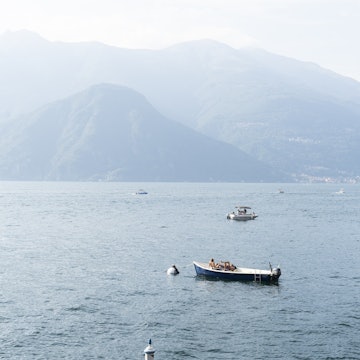

If you decide to visit friends and family this holiday season, here's how to do it safely © FG Trade / Getty
Celebrating the holidays with loved ones can be stressful. Whether it's negotiating a political minefield over Thanksgiving dinner, finding a perfect gift for the person who has everything, or coping with the perils of precarious winter travel, there's always something worthy of worry.
But this year, navigating the on-going health crisis adds a new layer of stress. "Cases [of COVID-19] are up in 41 states, and 17 states are reporting unprecedented surges," reports Dr. Syra Madad, an infectious disease epidemiologist in New York City and Fellow at the Harvard Kennedy School's Belfer Center.
Madad, who appears in the recent Netflix docuseries "Pandemic: How to Prevent an Outbreak," says the recent spike in new infections, along with the impact on hospitalizations, "paints a grim picture." Virus cases in the US are climbing toward a third peak, "and it's only going to increase from there."
“I do not think anybody should be traveling this holiday season,” says Madad, though she recognizes that "abstinence isn't the only approach." If you choose to travel and want to visit loved ones safely, she recommends merging social bubbles after a fourteen-day quarantine and using a Swiss cheese strategy – which is more than just a tasty Thanksgiving appetizer. "You want to make sure that you're layering on as many preventative measures as possible," she explains, so if one measure doesn't stop you from spreading or contracting the coronavirus, another one hopefully will.
Here’s everything else potential travelers should do to avoid spreading the coronavirus this holiday season.

Research where you're going
"The preference is to keep things local and not travel too far," says Madad, but if a longer distance is unavoidable, investigate how your desired destination is handling COVID-19.
To determine if a region is safe, Madad analyzes a few key benchmarks, including the daily number of new infections in an area, the overall percent positive, and whether new infections are increasing or decreasing. Ideally, a destination should have less than four new cases per 100,000 residents, a percent positive that's less than three, and a steady decline in infections for the week or two before you arrive.
Madad also suggests evaluating an area's testing infrastructure and hospital capacity. "You don't want to be in a place where the hospitals are overwhelmed," she says. "You want to know that hospitals in the area have 40% of their ICU capability free, so if you do get sick and require hospitalization, you can get the care that you need."
Next, it's necessary to research the travel requirements and restrictions for where you live and where you’re going. Laws differ between states and countries, and could include mandatory testing or fourteen-day quarantines. People who fail to follow guidelines may pay a hefty price, like in New York City, where a Florida visitor recently broke the state-mandated quarantine and now faces up to $1,500 in fines.
Plan how you're getting there
Many airlines, train services, and rest stops are doing an impeccable job keeping the public safe during the pandemic, but no transportation type is perfect.
If traveling by car, minimize the number of stops taken along your route by packing the essentials, including – but not limited to – drinks, snacks, toilet paper, face masks, and hand sanitizer that contains at least 60% alcohol. Wash or sanitize your hands immediately after using shared surfaces like gas pumps.
Anyone traveling by plane or train should be ready to wear a mandatory face mask (preferably an N-95) from the moment their journey begins until they reach their final destination. The CDC recommends touching as few frequently-used surfaces as possible, which means opting for digital tickets and using no-touch trash cans and doors when available. With limited food and beverage service on planes, remember to bring water and snacks for the trip, too.
To avoid getting squished next to a stranger for a long flight, check to see if your preferred airline will be operating at reduced capacity. For train rides, consider traveling at off-peak hours and leaving an empty row between yourself and fellow passengers when possible.

Get tested and quarantine
Getting tested for the coronavirus is an essential part of everyone's travel checklist and should be done both before and after a journey. Tests can be completed at urgent cares, pharmacies, most hospitals, and sometimes at sites like airports or hotels. Still, according to Madad, a test "shouldn't negate you from quarantining."
A negative test is only a snapshot in time - not a picture of the present - and some COVID-19 tests may yield false-negative results. If you plan on coming in close contact or gathering in tight quarters with social circles outside of your household, Madad says quarantining for fourteen days is the best way to ensure everyone’s safety.
Choose a long-term rental that’s right for you
When contending with a lengthy quarantine, investigate what home rentals in the area have adequate amenities for an extended stay. Spending two weeks cooking meals, catching up on Netflix, and working remotely in your home-away-from-home are far more enjoyable with your favorite creature comforts. If you're clocking in at the virtual office, ensure there's a strong wifi connection. Multiple rooms with plenty of privacy can be the saving grace for a large family. An outdoor space will help you stay sane. Never underestimate the power of a fully stocked kitchen or a long list of local delivery options.
Because of the coronavirus, many home-share platforms have implemented cleaning protocols to make their listings COVID-safe. In April, Airbnb introduced the Enhanced Cleaning Initiative, which allows hosts to earn an "Enhanced Clean" certification by following an extensive five-step cleaning process. Guests can search for participating hosts on the platform before booking their rental.
Hotels around the world have also updated their procedures to meet the needs of guests. Some offer contact-free check-in, apps with digital room keys, and a lengthy list of new cleaning and food safety standards. With limited room, no kitchen, and the possibility of running into people in elevators and shared spaces, most hotels still aren't ideal accommodations for travelers hoping to self-isolate, however.
Regardless of where you stay, make sure there's a flexible cancellation policy in the event of last-minute travel changes. The CDC also recommends asking your host or hotel about their cleaning and disinfecting policies and confirming that on-site staff will be wearing masks.

Establish expectations with loved ones
Events with friends and family – where spirits are high and guards are down – can be some of the most dangerous when it comes to COVID-19. "Even small gatherings are perpetuating the outbreak," says Madad, and following health guidelines is equally essential with those you trust.
While there's no magic number for a pandemic-friendly party, Madad says it's imperative to "limit the number of people who are together at one time." Whoever is hosting should safely fit all guests in an area with adequate ventilation – preferably outdoors – while maintaining social distancing (at least six feet apart) and keeping household units together. She also suggests limiting the number of meals shared as a group and opting for individually-plated food instead of buffet-style dining. The regular rules still apply, too: wear a mask, wash your hands, and stay home if you're feeling under the weather.
It helps to establish clear expectations around these protocols before your arrival. Communicating your boundaries will keep everyone safe and mitigate any potential misunderstandings in person.
Use your imagination
Creativity is the key to celebrating the holidays this year. "I have three kids, two of whom are in elementary school, and they're very big on Halloween," Madad shares. She has a social bubble of her own and plans to invite a few friends over for a Halloween egg hunt on her property. "I'm not canceling Halloween, but I am taking precautions to reduce our risk, knowing that it won't be zero."
As for Thanksgiving and the holidays that follow, Madad hasn't decided what she'll do. "There are a lot of factors to consider as we move to the future holidays," she says. Infection rates could rise or fall, testing infrastructure could improve, and the only thing we should expect is the unexpected. "Things are changing so fast, and there's so much uncertainty," she says, "so I'm taking it one holiday at a time."
You might also like:
9 expert tips for a safe road trip during the pandemic
Ask LP: are airlines doing enough to keep us safe from COVID-19?
Has your job gone remote? These countries are welcoming digital nomads
















